Is It Smart To Buy Enact Holdings, Inc. (NASDAQ:ACT) Before It Goes Ex-Dividend?
Enact Holdings, Inc. (NASDAQ:ACT) stock is about to trade ex-dividend in four days. Typically, the ex-dividend date is one business day before the record date which is the date on which a company determines the shareholders eligible to receive a dividend. The ex-dividend date is of consequence because whenever a stock is bought or sold, the trade takes at least two business day to settle. Accordingly, Enact Holdings investors that purchase the stock on or after the 29th of May will not receive the dividend, which will be paid on the 13th of June.
The company's next dividend payment will be US$0.185 per share. Last year, in total, the company distributed US$1.45 to shareholders. Based on the last year's worth of payments, Enact Holdings stock has a trailing yield of around 4.7% on the current share price of US$30.66. Dividends are an important source of income to many shareholders, but the health of the business is crucial to maintaining those dividends. That's why we should always check whether the dividend payments appear sustainable, and if the company is growing.
View our latest analysis for Enact Holdings
Dividends are typically paid from company earnings. If a company pays more in dividends than it earned in profit, then the dividend could be unsustainable. Enact Holdings is paying out just 16% of its profit after tax, which is comfortably low and leaves plenty of breathing room in the case of adverse events.
Companies that pay out less in dividends than they earn in profits generally have more sustainable dividends. The lower the payout ratio, the more wiggle room the business has before it could be forced to cut the dividend.
Click here to see the company's payout ratio, plus analyst estimates of its future dividends.
Have Earnings And Dividends Been Growing?
Businesses with strong growth prospects usually make the best dividend payers, because it's easier to grow dividends when earnings per share are improving. If earnings fall far enough, the company could be forced to cut its dividend. It's encouraging to see Enact Holdings has grown its earnings rapidly, up 22% a year for the past five years.
The main way most investors will assess a company's dividend prospects is by checking the historical rate of dividend growth. In the past two years, Enact Holdings has increased its dividend at approximately 61% a year on average. Both per-share earnings and dividends have both been growing rapidly in recent times, which is great to see.
To Sum It Up
From a dividend perspective, should investors buy or avoid Enact Holdings? Typically, companies that are growing rapidly and paying out a low fraction of earnings are keeping the profits for reinvestment in the business. Perhaps even more importantly - this can sometimes signal management is focused on the long term future of the business. Overall, Enact Holdings looks like a promising dividend stock in this analysis, and we think it would be worth investigating further.
With that in mind, a critical part of thorough stock research is being aware of any risks that stock currently faces. For instance, we've identified 2 warning signs for Enact Holdings (1 shouldn't be ignored) you should be aware of.
A common investing mistake is buying the first interesting stock you see. Here you can find a full list of high-yield dividend stocks.
Have feedback on this article? Concerned about the content? Get in touch with us directly. Alternatively, email editorial-team (at) simplywallst.com.
This article by Simply Wall St is general in nature. We provide commentary based on historical data and analyst forecasts only using an unbiased methodology and our articles are not intended to be financial advice. It does not constitute a recommendation to buy or sell any stock, and does not take account of your objectives, or your financial situation. We aim to bring you long-term focused analysis driven by fundamental data. Note that our analysis may not factor in the latest price-sensitive company announcements or qualitative material. Simply Wall St has no position in any stocks mentioned.

 Yahoo Finance
Yahoo Finance 
